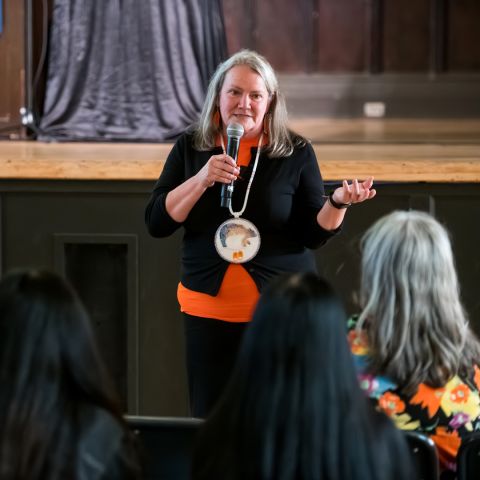
In recognition of the National Day for Truth and Reconciliation, Queen’s Law hosted a talk by incoming faculty member Kimberly Murray, the federally appointed Independent Special Interlocutor for Missing Children and Unmarked Graves and Burial Sites. Murray discussed her July 2024 report, Sites of Truth, Sites of Conscience, with Queen’s students, faculty, staff, and alumni in Grant Hall and online on September 26.
In opening remarks, Dean Colleen M. Flood said, “Kimberly Murray has been committed to supporting the work of Survivors and Indigenous communities to protect, locate, identify, repatriate, and commemorate the children who died while forced to attend residential schools.” Flood called the report a “groundbreaking document,” noting it was an extension of Murray’s work for the Truth and Reconciliation Commission with former Queen’s Chancellor Murray Sinclair, who chaired the commission.
Chancellor Shelagh Rogers, an honorary witness to the TRC, introduced Murray, saying, “Her work provides scaffolding for truth, healing, and reconciliation, and for making good the conscience of this country.”
To provide the audience with an understanding of what the report is about, Murray read a paragraph from its introduction: “The buildings, burial grounds, and cemeteries on the sites of former Indian Residential Schools are etched deeply in Survivors’ memories. Once places of silence and suffering, they are now sites of truth. Once places of brutal violence and genocide, they are now sites of conscience. Survivors can never forget the memories of trauma and death held in these sites; now Canada and all Canadians must do likewise. A site of conscience holds truths about the past and memories of injustice that must be exposed, acknowledged, remembered, shared, and learned from so this will never happen again.”
Professor Lindsay Borrows closed the talk by thanking Murray and inviting attendees to a reception catered by Lily Dolls Farm from Tyendinaga Mohawk Territory.
Listen to a podcast of Kimberly Murray talk on QLAW-POD.
Sites of Truth, Sites of Conscience is available on the Office of the Special Interlocutor’s website.
On October 29, Murray will release her final report, which will recommend a new legal framework to identify, protect, and commemorate the children and their burial sites. In January 2025, she joins the Faculty of Law as Queen’s National Scholar in Indigenous Legal Studies.